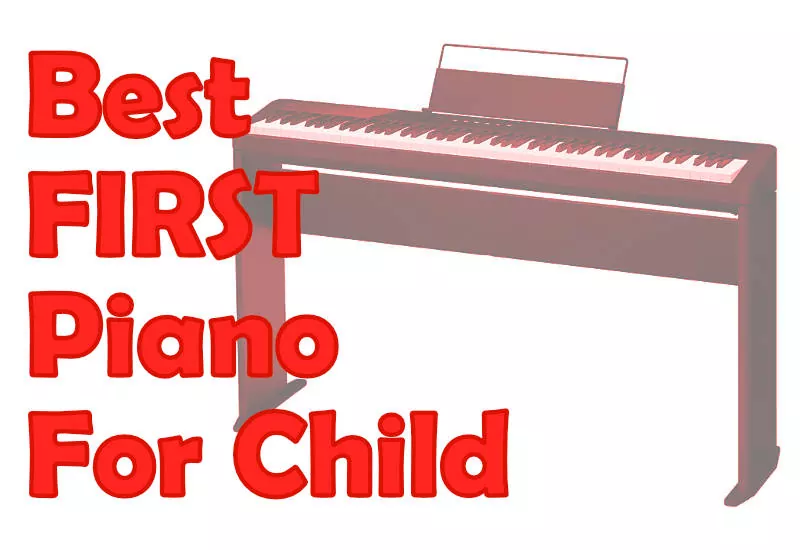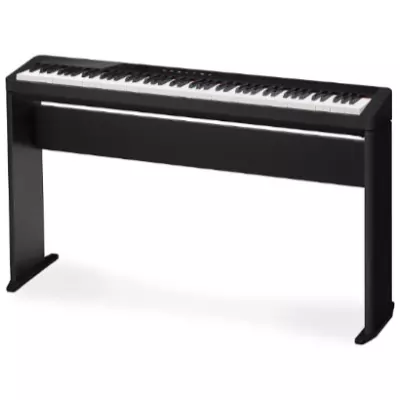Best First Piano For Children

Contents
A child interested in learning music even at a young age is special, especially in this day and age of computer and mobile games. Choosing the best first piano for children can be intimidating and this article will help you with what features to look for.
Remember that when buying the best piano for children you are not just buying a physical object, not even a toy. A piano could be the start of a life full of music and creativity. It could be the start of a lifelong passion for music, hence, when selecting the best piano for kids to learn, you have to get it right.
Kid-Specific Considerations
-
Size
There are different sizes and shapes of digital pianos in the market. You’ll also find pianos with only 25 keys up to the standard 88 keys.
Pianos that have fewer keys have a lower price tag. They are also space-saving. However, the piano’s playability will be sacrificed. While a small kid doesn’t have a wide arm span yet for a full-sized keyboard, they will have limited pieces to play as they grow. Intermediate-level pieces need the full range of the conventional 88-key piano. You will have to upgrade as your child grows if you settle for a lesser number of keys. -
Weighted Keys
Acoustic pianos have weighted keys because of the hammer mechanism to strike the string while the key is being played. This mechanism plays a big role in the pianist’s style and technique. This is the reason digital piano companies try to replicate this natural feeling. There are four types of key weighting:
- Spring action – usually found in less expensive keyboards. Spring action can be velocity-sensitive (touch response) or velocity-insensitive. Velocity-sensitive keys adjust the volume of the note based on how hard the pianist strikes the keys.
- Semi-weighted – is typically between weighted and spring action keys, which are often velocity-sensitive.
- Weighted – have close to actual acoustic piano keys. Typically, velocity-sensitive.
- Hammer Action – is the closest to the real thing. The lower keys are weighted heavier simulating the heavier hammers on an acoustic piano.
Experts recommend avoiding unweighted keys because even if they are easier for a child to use (good for beginners), they are not likely to develop the hand strength or feel for natural keys, thus, making it challenging for your child to transition to an acoustic piano when they want to. The price will be slightly higher, though.
-
Learning Material
Do you want your child to veer away from their tablet, cellular phone, or computer? You’d be surprised to know that there are digital piano makers that are taking advantage of our children’s addiction to apps, screens, and games. Using interfacing apps, lesson plans and song walk-throughs are available, and children won’t even feel like they are studying music. They may never replace actual piano teachers these applications can still be good for children to study and practice. There are even digital pianos with lesson mode options.
Should You Choose Digital or Acoustic?
Check out this short write-up on answering whether to pick a digital or acoustic piano. Should you be interested in a much comprehensive guide, I suggest to read Xuan Yu Lim’s article.
Budget Considerations
One of the most important considerations when purchasing any musical instrument is the budget. How much are you willing to spend for your kid’s first piano or how much can you afford?
First off, you are never really sure if your child would stick to learning the piano or if this is just another phase. Young kids have a short attention span. For a while, they love playing with a new toy, and weeks after, that same toy would just be kept in storage. It is understandable to be hesitant.
If you have a tight budget, then spending at least $500 on a piano is not a good idea. But the good news is there are digital pianos that are sold just above $200. However, if you are certain that music is what your kid loves to do, then it would be a better idea to invest in the more expensive yet long-term use standard 88-key piano.
The Best First Piano for Children to Learn
Our recommendation is the Casio Portable Keyboard PX-S1000RD, although the manufacturer just release a new successor Casio Portable Piano PX-S1100RD. Casio is one of the leading manufacturers of digital pianos. PXS1000RD is part of its Privia digital piano series which are known for their lifelike sound and authentic playability. It has a sleek glossy panel. The unit gives high-end acoustic grand piano feel with its 88 keys. It is ideal for young kids to learn the piano and they can still use it as they grow because of the standard 88-key feature, no need to upgrade.
It has touch sensor controls that are only visible after turning on the power button, leaving a seamless top panel when turned off. PX-S1000RD comes with the newest feature from Casio, the fully weighted Smart Scaled Hammer keyboard, providing uncompromising piano touch with a unique key scaling system that produces the distinctive sounds of each of the 88 notes. The ebony and ivory key textures are comfortable to the touch and your kids will enjoy learning music with this keyboard unit.
The PX-S1000RD model comes with three color-design to choose from, sleek black, pure white, and blazing red. It’s portable, so your kids can take it anywhere they want. it is a space saver and easy to stash away in the closet.
This Casio portable keyboard costs almost $600, a little expensive than other digital keyboards available, but with its good quality features, you will be getting your money’s worth.
Parents, Teachers & Sheet Music Seekers:
If I offered to provide you hundreds of legit sheet music PDFs for your kids:
- Brand-New & Exclusive Compositions
- Age & Level Appropriate
- With INSTANT Online Access
- Worry-FREE Licensing & Copyright
...would you take me up on that offer?
ABOUT
I started Music4Kids with a simple goal in mind: To provide valuable information to guiding parents who want to raise musically inclined kids.
Click to read on
